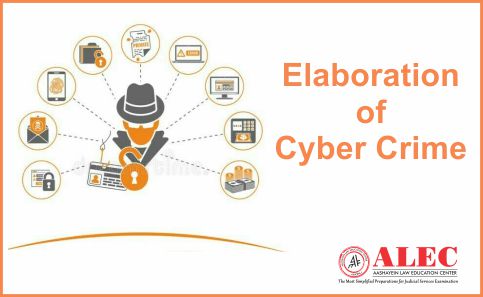The very term, “cyberlaw”, is a new and emerging one to the society with the comparison of other codified laws. The term, “cyberlaw”, has been defined as the law related to the cyber world and the goal is to protect the cyber victims from cyber crimes. Initially, there was no specific provision for cyber law. The reference and some provisions related to the cyber law can be seen in some other laws like the law of contract, the law of tort, intellectual property rights, and the Indian Penal Code. Generally, in cyberlaw, there is a combination of all these laws.
The Cyberlaw enters only when the cybercrime has been committed. The main ingredient of cybercrime is a computer device or mobile phone or tablet and another one is the internet. Cybercrime is the illegal access of computer or mobile or tablet through internet connection. Even cybercrime can be committed to one who has no idea and knowledge about it. Cyberlaw comes into force in India with the Information Technology Act in 2020. The Information Technology Act defines the various types of cybercrimes, punishments for cyber crimes and the legal provisions related to cybercrimes.
You can also read the latest judgment by visiting [Latest Judgment]
For more information, visit [Aashayein Enquiry Section]
Types of Cyber Crimes:
Identity theft- Identity theft is one of the popular cybercrimes committed in all over the world. When the personal information and data of a person is stolen or used by another person to commit illegal activity, it is known as identity theft. Generally, identity theft is committed to gain personal profit by using the financial resources of the victim.
Cyberterrorism- Cyberterrorism is the crime which is committed by a person or a group of persons to create a threat of extortion or any injury or harm to any individual, organization, or the state. Cyberterrorism is mainly constituted to illegally earn big profit from both the Government and the private sector.
Cyberbullying- When crime of harassment, abuse, defamation, committed by the teenagers through social media, or any electronic device like laptop, mobile phone, tablet, that can be considered as cyberbullying. If the said crime is committed by the adults instead of teenagers, then the said crime can be considered as the cyberstalking.
Defamation- Freedom of speech is the fundamental right of every person. It is also applicable in the cyber world. But there is obviously the limitation. If a person's speech or expression in social media harms or injures the reputation of any individual or any organization, the person can be charged with defamation.
Copyright- Nowadays crimes related to copyright become one kind of cyber crime. For example, if a person creates a content, only he or she will have the copyright on that. Others can not use the content or any other creation without the permission of the creator. Through the social media, people are easily copying the products, names, logos and other creations of another persons or organizations without their permission with the help of some cyber tools.
Trade Secrete- Though there are many securities for the trade in both the Government and the private sectors, a lot of risk arises. Hackers from other countries are always trying to steal important information and data related to trade.It is the regular practice of an enemy country to another country.
Making Pornography- With the help of electronic device and internet, one can make easily pornography of any woman by using her photograph. Then such criminals commit more serious crimes by blackmailing the women with the video to earn profit. Apart from that, such type of criminals, after their break-ups, use the intimate video of their ex-girlfriends to blackmail them and to earn money from the videos.
Posting Fake News in Social Media- Fake news in social media plays a vital role to commit cybercrime. There is enough freedom for every individual to post anything and to create any news and post it with the help of the internet and electronic device. Fake news regarding serious issues like health or recent COVID matter create violation to the whole society.
The punishment for such crimes are serious and codified in the Information Technology Act. Such criminals can be charged with both the fine and imprisonment.

